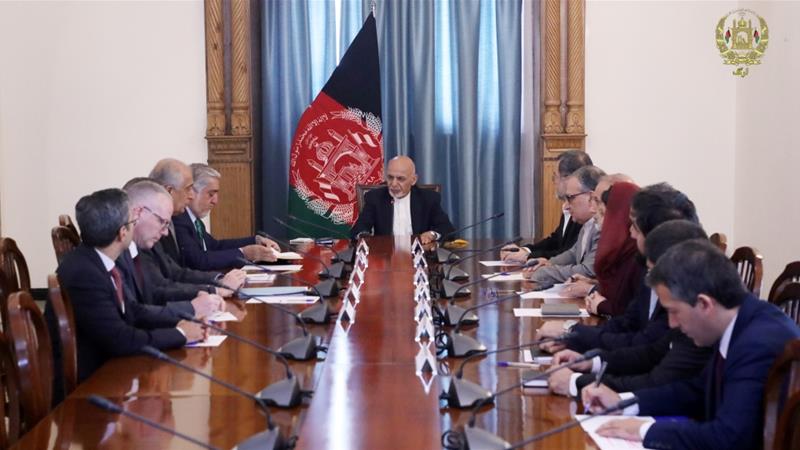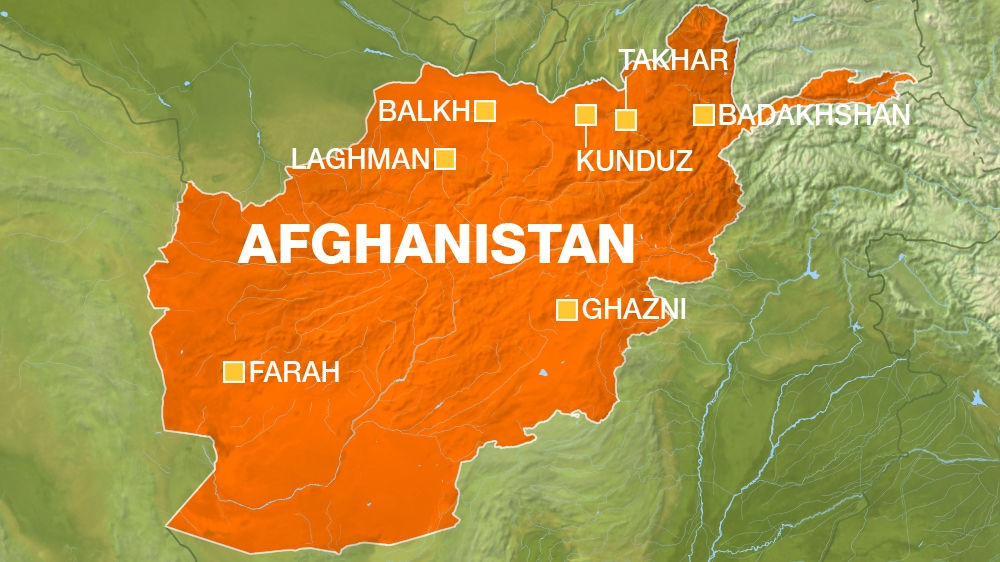Zalmay Khalilzad briefs President Ashraf Ghani on US-Taliban talks as clashes intensify in several provinces.
2 Sept 2019

more on Afghanistan
- The Afghan ‘peace’ deal will not bring peace to the Afghan peopleyesterday
- Taliban deal would see US troops ‘withdraw from five bases’2 days ago
- US envoy shows draft of deal with Taliban to Afghan president2 days ago
- Amid heavy fighting in north, US envoy meets Afghan president2 days ago
The United States special envoy to Afghanistan has shown the Afghan president the draft of an agreement between the US and the Taliban after almost a year of negotiations with the group, Afghan officials said.
The president’s spokesman, Sediq Sediqqi, told reporters on Monday that the US envoy Zalmay Khalilzad shared “key details” of the US-Taliban draft agreement with President Ashraf Ghani, after an initial meeting the previous evening upon arriving from Qatar where the ninth round of US-Taliban talks concluded over the weekend.
The negotiations have focused on the withdrawal of thousands of US troops from Afghanistan in exchange for guarantees by the Taliban not to allow the country to be used as a base for attacks abroad.
Ahead of Monday’s press conference, the president’s adviser Waheed Omar confirmed Khalilzad’s meeting with President Ghani and Chief Executive Abdullah Abdullah.
“He [Khalilzad] has shown a copy of the draft framework agreement between US and Taliban. We will look into the document and discussions with Amb Khalilzad and team will continue,” Omar said in a Twitter post.
The Afghan government has been shut out of the negotiations as the Taliban dismisses it as a “puppet” of the US, but intra-Afghan talks that include the government are meant to follow a US-Taliban deal.
Khalilzad over the weekend said the US and the Taliban are “at the threshold of an agreement” – even as fighting between the group and government forces in northern Afghanistan intensified.
The Taliban on Sunday attacked Pul-e Khumri, the capital of Baghlan province, just a day after hundreds of its fighters overran parts of Kunduz, a strategic city and the capital of the eponymous province that the group has twice come close to taking in recent years.
On Monday, Afghan local media reported attacks were ongoing in the provinces of Kunduz, Takhar, Badakhshan, Balkh, Farah and Herat. The Kabul-Baghlan and Baghlan-Kunduz highways were also blocked.

Taliban’s position of strength
Amid high expectations that the US-Taliban talks will end with an agreement, the latest fighting underlined the Taliban’s apparent determination to go into any deal from a position of strength on the battlefield.
Suhail Shaheen, a spokesman for the Taliban’s political office in Doha, said both sides were in discussions to finalise technical issues.
“We are on the verge of ending the invasion and reaching a peaceful solution for Afghanistan,” Shaheen said on Twitter.
An agreement would not on its own end the fighting between the Taliban and Afghan security forces, but would allow the start of so-called “intra-Afghan” peace talks.READ MORE
Afghan independence: Artists mark 100-year anniversary
It was not clear whether the Taliban would agree to talk directly with Ghani’s government.
Some Taliban officials have said they would only agree to talk to Afghan officials in a private capacity, not as representatives of the state, and they remain opposed to presidential elections scheduled for September 28.
It was also unclear whether the agreement would cover the full withdrawal of all 14,500 US troops from Afghanistan or how long a pullout would take.
More than 30,000 foreign troops are in the country, most serving as part of a NATO-led mission to train and assist Afghan forces.
Thousands of US troops are also engaged in a separate counterterrorism mission fighting armed groups such as the Islamic State of Iraq and the Levant (ISIL or ISIS) and al-Qaeda.
Suicide bombings and combat operations have continued throughout the talks and the fighting in the north underlined the vulnerability of large parts of Afghanistan, where the Taliban control more territory than at any time since being overthrown by a US-led campaign in 2001.
According to the United Nations, 3,804 civilians – including more than 900 children – were killed and 7,000 wounded in 2018, the deadliest year for non-combatants in the conflict.
SOURCE: Al Jazeera and news agencies
